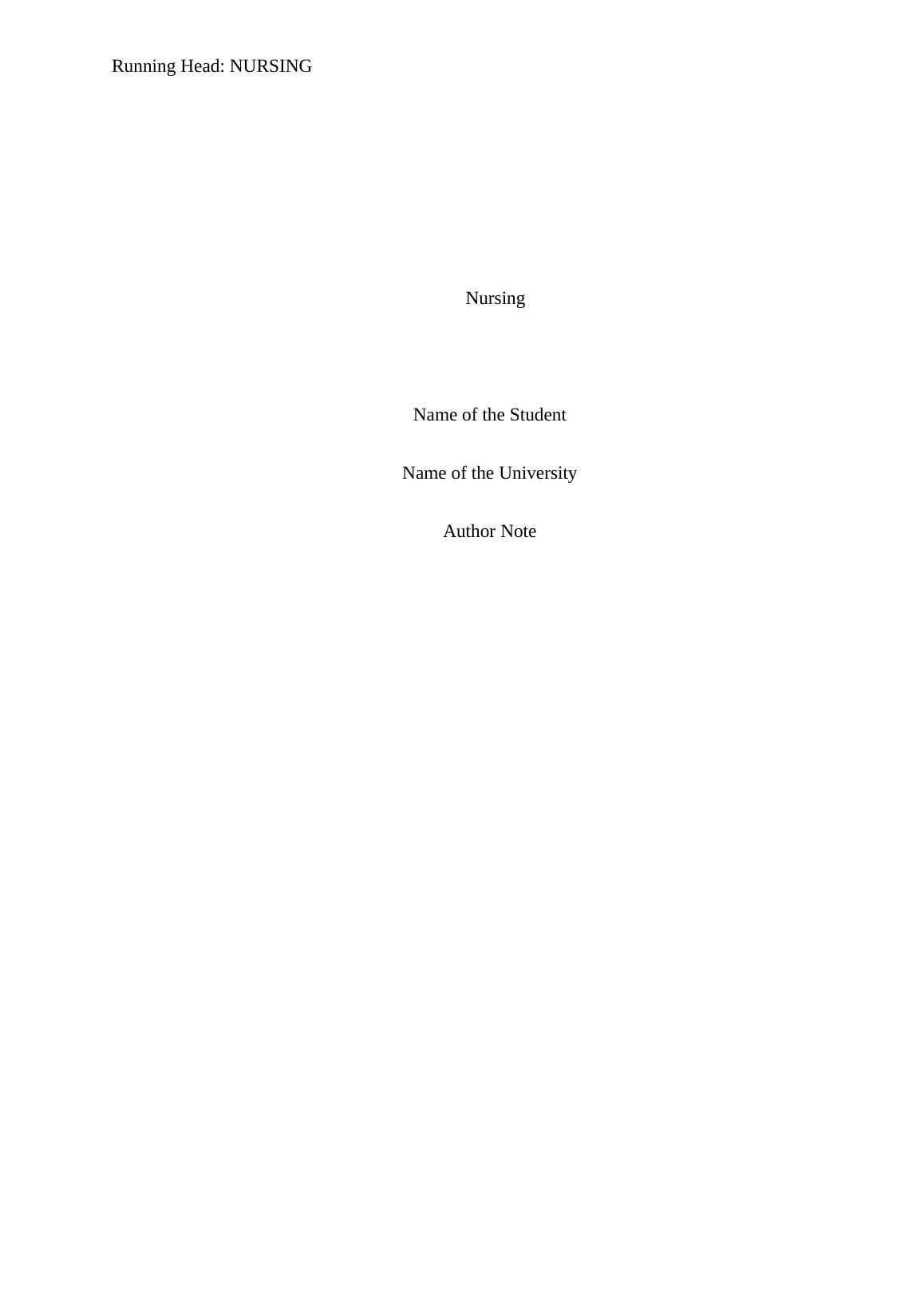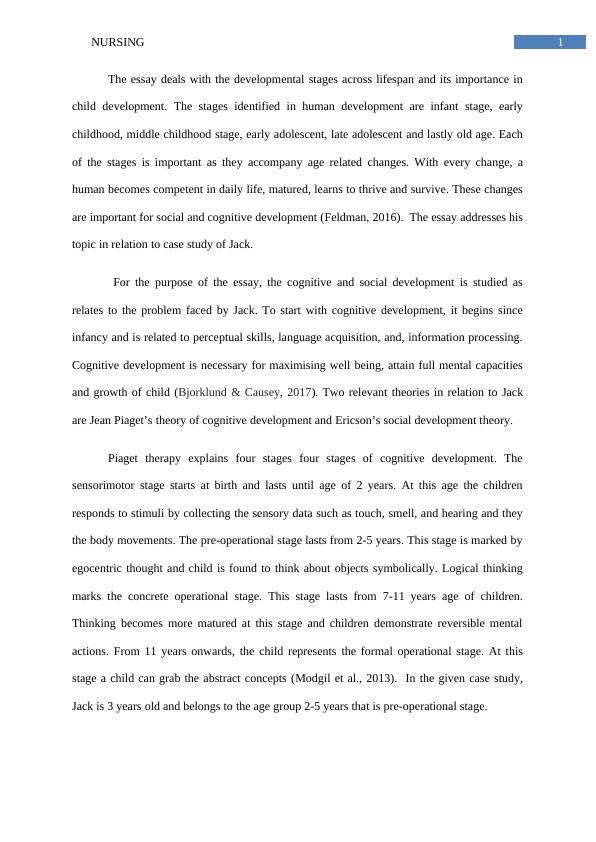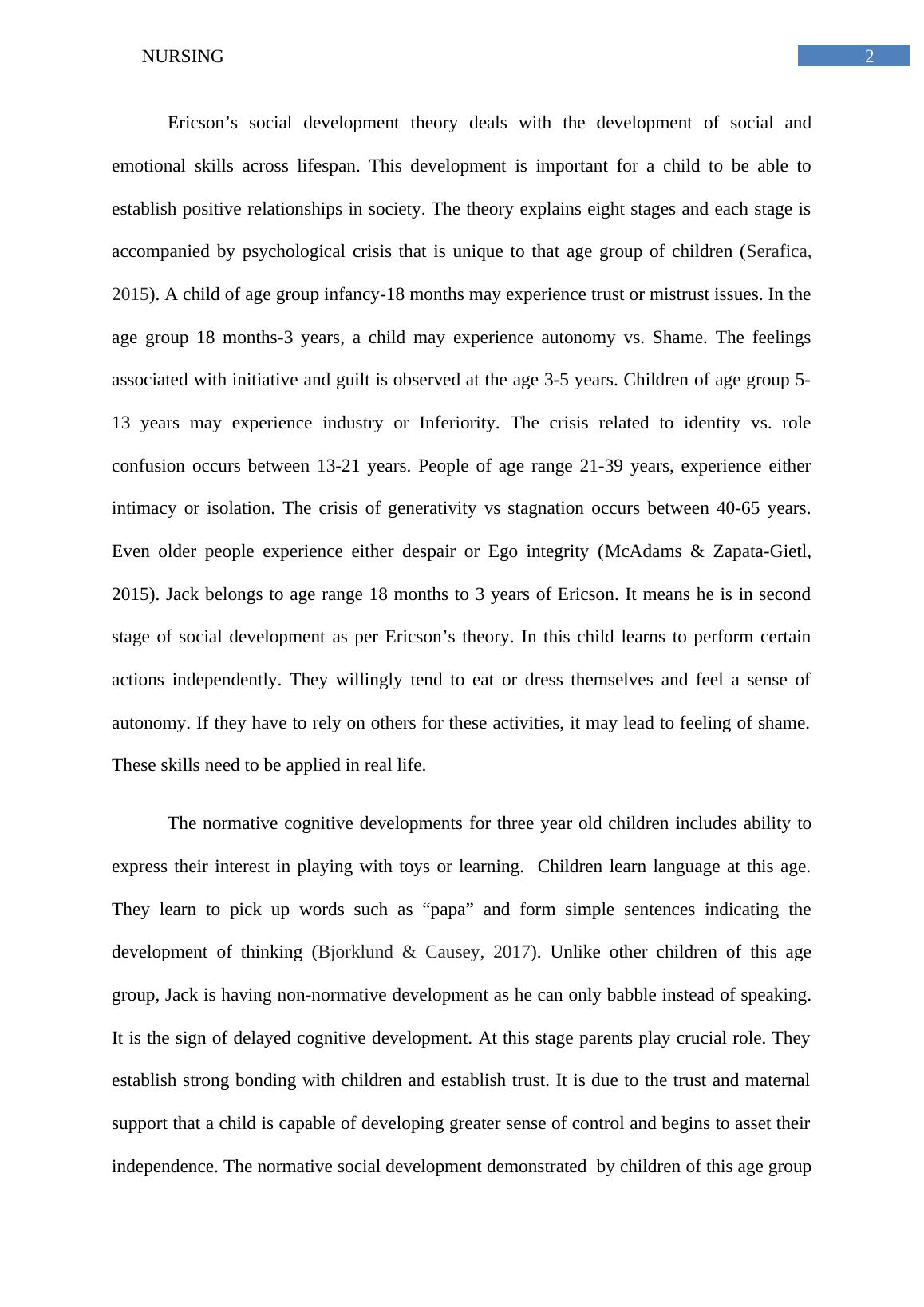The Developmental Stages Across Lifespan | Essay - Desklib
8 Pages2084 Words188 Views
Added on 2020-04-01
The Developmental Stages Across Lifespan | Essay - Desklib
Added on 2020-04-01
ShareRelated Documents
Running Head: NURSING Nursing Name of the StudentName of the University Author Note

1 NURSINGThe essay deals with the developmental stages across lifespan and its importance inchild development. The stages identified in human development are infant stage, earlychildhood, middle childhood stage, early adolescent, late adolescent and lastly old age. Eachof the stages is important as they accompany age related changes. With every change, ahuman becomes competent in daily life, matured, learns to thrive and survive. These changesare important for social and cognitive development (Feldman, 2016). The essay addresses histopic in relation to case study of Jack. For the purpose of the essay, the cognitive and social development is studied asrelates to the problem faced by Jack. To start with cognitive development, it begins sinceinfancy and is related to perceptual skills, language acquisition, and, information processing.Cognitive development is necessary for maximising well being, attain full mental capacitiesand growth of child (Bjorklund & Causey, 2017). Two relevant theories in relation to Jackare Jean Piaget’s theory of cognitive development and Ericson’s social development theory.Piaget therapy explains four stages four stages of cognitive development. Thesensorimotor stage starts at birth and lasts until age of 2 years. At this age the childrenresponds to stimuli by collecting the sensory data such as touch, smell, and hearing and theythe body movements. The pre-operational stage lasts from 2-5 years. This stage is marked byegocentric thought and child is found to think about objects symbolically. Logical thinkingmarks the concrete operational stage. This stage lasts from 7-11 years age of children.Thinking becomes more matured at this stage and children demonstrate reversible mentalactions. From 11 years onwards, the child represents the formal operational stage. At thisstage a child can grab the abstract concepts (Modgil et al., 2013). In the given case study,Jack is 3 years old and belongs to the age group 2-5 years that is pre-operational stage.

2 NURSINGEricson’s social development theory deals with the development of social andemotional skills across lifespan. This development is important for a child to be able toestablish positive relationships in society. The theory explains eight stages and each stage isaccompanied by psychological crisis that is unique to that age group of children (Serafica,2015). A child of age group infancy-18 months may experience trust or mistrust issues. In theage group 18 months-3 years, a child may experience autonomy vs. Shame. The feelingsassociated with initiative and guilt is observed at the age 3-5 years. Children of age group 5-13 years may experience industry or Inferiority. The crisis related to identity vs. roleconfusion occurs between 13-21 years. People of age range 21-39 years, experience eitherintimacy or isolation. The crisis of generativity vs stagnation occurs between 40-65 years.Even older people experience either despair or Ego integrity (McAdams & Zapata-Gietl,2015). Jack belongs to age range 18 months to 3 years of Ericson. It means he is in secondstage of social development as per Ericson’s theory. In this child learns to perform certainactions independently. They willingly tend to eat or dress themselves and feel a sense ofautonomy. If they have to rely on others for these activities, it may lead to feeling of shame.These skills need to be applied in real life. The normative cognitive developments for three year old children includes ability toexpress their interest in playing with toys or learning. Children learn language at this age.They learn to pick up words such as “papa” and form simple sentences indicating thedevelopment of thinking (Bjorklund & Causey, 2017). Unlike other children of this agegroup, Jack is having non-normative development as he can only babble instead of speaking.It is the sign of delayed cognitive development. At this stage parents play crucial role. Theyestablish strong bonding with children and establish trust. It is due to the trust and maternalsupport that a child is capable of developing greater sense of control and begins to asset theirindependence. The normative social development demonstrated by children of this age group

End of preview
Want to access all the pages? Upload your documents or become a member.
Related Documents
Human Development Stages Essaylg...
|9
|2087
|75
Cognitive and Social Development of Children | Reportlg...
|7
|2082
|67
Cognitive and Social Development in Children Assignmentlg...
|8
|1759
|270
The Age Related Changes | Assignmentlg...
|6
|1693
|343
Human Development and Lifespan Transition Issueslg...
|7
|1368
|31
Assignment on Psychological Perspective Healthlg...
|9
|2157
|88
